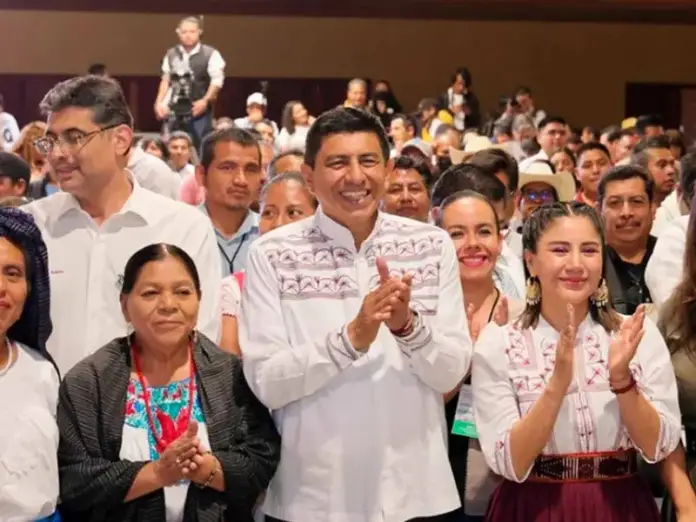In an effort to ensure that the voices and knowledge of indigenous and Afro-Mexican communities are a fundamental part of the 2025-2030 National Development Plan, Governor Salomón Jara Cruz inaugurated the Congress of the Indigenous and Afro-Mexican Communities of Oaxaca, a space for dialogue and reflection at the Oaxaca Cultural and Convention Center (CCCO).
During the event, the governor stressed that this meeting is key to ensuring that the new laws respect and strengthen the ways of life of indigenous peoples, in addition to consolidating the historical recognition promoted with the reform to the Constitution presented in February 2024 and which came into force in October of the same year.
“In 2025, within the framework of the preparation of the National Development Plan, I am certain that the indigenous peoples of Oaxaca will once again be protagonists, because we are a people transforming its history,” said Jara Cruz.
Before representatives of the indigenous communities, the governor stressed that Oaxaca is the state with the greatest ethnic, cultural and linguistic diversity in Mexico, being home to 15 indigenous peoples and the Afro-Mexican people:
Amuzgos
Chatinos
Chinantecos
Chocholtecos
Chontales
Cuicatecos
Huaves
Ixcatecos
Mazatecos
Mixes
Mixtecos
Náhuas
Tacuates
Triquis
Zapotecos
Afro-Mexicans
He also highlighted that Oaxaca has the highest percentage of indigenous language-speaking population in the country, with 1.2 million people, that is, 27.3% of the total state population. In the entity, 15 native languages and 176 linguistic variants are spoken, which makes it a pillar of Mexican cultural identity.
A congress to build the future with equality and dignity
The Congress, headed by the Secretariat of Interculturality, Indigenous and Afro-Mexican Peoples and Communities (SIPCIA), aims to translate the new constitutional mandate into public policies that benefit indigenous peoples.
To this end, six working groups have been established focused on key issues for the development of these communities: justice, health, education, women, language and thought, and social development.
“Here we will have to reflect on how to translate the new constitutional mandate into public policies; discuss what our contributions will be so that the second floor of the transformation continues to be built on a basis of equality and dignity for our peoples and communities,” Jara Cruz emphasized.

For her part, the head of SIPCIA, Juana Hernández López, stressed the importance of this meeting to ensure the recognition and vindication of indigenous and Afro-Mexican peoples.
“Today we are faced with the historic opportunity to build a new reality centered on the particular needs of communities, combating the effects of racism and discrimination and promoting their participation in the political, economic, social and cultural life of the state,” she said.
Source: excelsior




